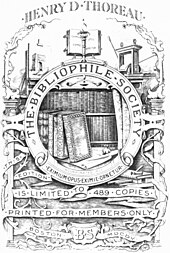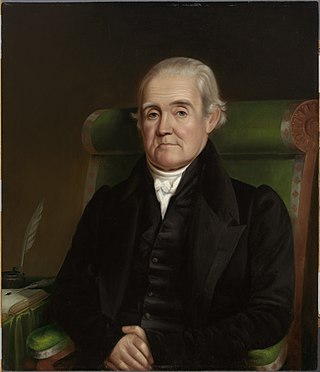
Noah Webster was an American lexicographer, textbook pioneer, English-language spelling reformer, political writer, editor, and author. He has been called the "Father of American Scholarship and Education". His "Blue-Backed Speller" books taught generations of American children how to spell and read. Webster's name has become synonymous with "dictionary" in the United States, especially the modern Merriam-Webster dictionary that was first published in 1828 as An American Dictionary of the English Language.

Thomas Frognall Dibdin was an English bibliographer, born in Calcutta to Thomas Dibdin, the sailor brother of the composer Charles Dibdin.

Bibliomania can be a symptom of obsessive–compulsive disorder which involves the collecting or even hoarding of books to the point where social relations or health are damaged.

Book collecting is the collecting of books, including seeking, locating, acquiring, organizing, cataloging, displaying, storing, and maintaining whatever books are of interest to a given collector. The love of books is bibliophilia, and someone who loves to read, admire, and a person who collects books is often called a bibliophile.
The bibliographical definition of an edition is all copies of a book printed from substantially the same setting of type, including all minor typographical variants.

Bookworm is a general name for any insect that is said to bore through books.

George Holbrook Jackson was a British journalist, writer and publisher. He was recognised as one of the leading bibliophiles of his time.

A used book or secondhand book is a book which has been owned before by an owner other than the publisher or retailer, usually by an individual or library.
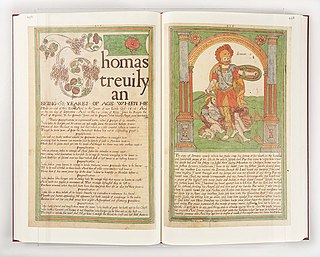
The Roxburghe Club is a bibliophilic and publishing society based in the United Kingdom.

The Oxford University Society of Bibliophiles is a book collecting and bibliophile club run by students at the University of Oxford. It was originally founded in 1950 by a group of young bibliophiles, with the first meetings being held in Hilary term of 1951. For fifty years the Society held regular lectures, visits and other events during the University terms, and many of the leading bibliographers, librarians, book collectors, booksellers and other literary figures of the period spoke to the Society or hosted visits. Many of the Society's junior members went on to become prominent figures in the world of books, and some later served as senior members of the Society. One of the most influential members was John Sparrow, Warden of All Souls, who encouraged a love of books and manuscripts in a generation of students, and hosted a termly "Warden's Meeting"at which members were encouraged to bring items from their own libraries to pass round and say a few words about; the tradition of the "Warden's Meeting" continued after 1986, when the Warden himself was too ill to host the meetings and, indeed, after his death in 1992. Another of the Society's traditions was the quality of the termly programme cards, often produced by the leading printers and private presses of the age, including the Oxford and Cambridge University Presses, the Rampant Lions Press, the Samson Press, the Fantasy Press, the Kit-Cat Press, Big Wheel Press, the Perpetua Press, the Incline Press, the Whittington Press, the Libanus Press, the Rocket Press, the Stanbrook Abbey Press and the Stamperia Valdonega.
Colin Ellis Franklin, FSA was an English writer, bibliographer, book-collector and antiquarian bookseller.

Nicholas Andrew Basbanes is an American author who writes and lectures about authors, books, and book culture. His subjects include the "eternal passion for books" ; the history and future of libraries ; the "willful destruction of books" and the "determined effort to rescue them" ; "the power of the printed word to stir the world" ; the invention of paper and its effect on civilization, and an exploration of Longfellow's life and art.
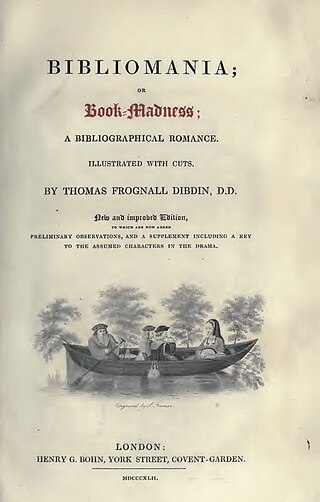
Bibliomania; or Book Madness was first published in 1809 by the Reverend Thomas Frognall Dibdin (1776–1847). Written in the form of fictional dialogues from bibliophiles, it purports to outline a malady called bibliomania.

The Library by Andrew Lang is a late 19th-century book published by McMillan & Co. as part of the “Art as Home” series. Continuing the tradition of de Bury’s The Philobiblon and Dibdin’s Bibliomania, The Library is a half-serious look at the craft of book-collecting for the amateur bibliophile.

Tsundoku (積ん読) is the phenomenon of acquiring reading materials but letting them pile up in one's home without reading them. The term is also used to refer to books ready for reading later when they are on a bookshelf.
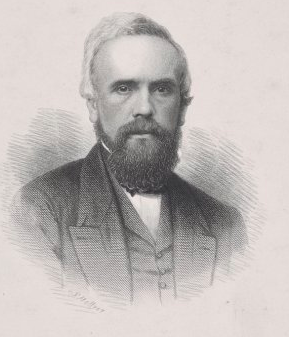
Joseph Sabin was a Braunston, England-born bibliographer and bookseller in Oxford, Philadelphia, and New York City. He compiled the "stupendous" multivolume Bibliotheca Americana: A Dictionary of Books Relating to America, considered a "bibliophilic monument;" and published the American Bibliopolist, a trade magazine. His sons Robert T. Sabin and William W. Sabin also worked in the bookselling business.
Pro Knigi – is a quarterly educational magazine that contains information about old books, the study thereof, the history of bibliophiles and the problems of book-collecting. It has been published in Moscow since 2007. The circulation of the magazine is about 2000 copies. It is distributed both by retail and subscription.
The National Union of Bibliophiles (NUB), full name Non-Commercial Partnership “The National Union of Bibliophiles”, is a public organisation, an association of bibliophiles of the Russian Federation. It was formed as legal entity in 2010.
Henrietta Collins Bartlett was an American bibliographer, Shakespeare scholar, and creator of the first modern census of Shakespeare's published drama. She has been called "one of the foremost bibliographers of her time," despite working in a scholarly field in which "the overwhelming majority has been male."

A Gentle Madness: Bibliophiles, Bibliomanes, and the Eternal Passion for Books is a 1995 nonfiction book of book collecting case studies by Nicholas A. Basbanes. It was a 1995 National Book Critics Circle Award finalist.

